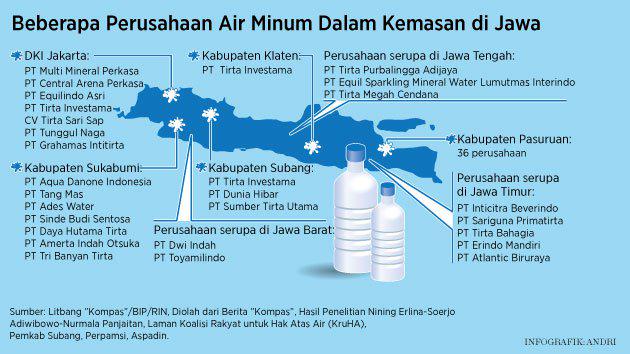Berita Terkait
- Anggaran DPR RI Tahun 2016-2018
- Kehadiran Anggota DPR Pada Masa Sidang Ke-2 Tahun 2017-2018
- Review Kinerja DPR-RI Masa Sidang ke-2 Tahun 2017-2018
- Fokus DPR Masa Sidang ke-3 Thn 2017-2018
- Konsentrasi DPR Terhadap Fungsinya Pada Masa Sidang ke - 3 Tahun 2017 – 2018
- Kehadiran Anggota DPR RI Masa Sidang ke-3 Tahun 2017-2018
- Review Kinerja Masa Sidang Ke-3 Tahun 2017-2018
- Konsentrasi DPR Terhadap Fungsinya Pada Masa Sidang ke - 4 Tahun 2017– 2018
- Peristiwa Menarik Masa Sidang ke-4 Tahun 2017-2018 (Bidang Legislasi)
- Peristiwa Menarik Masa Sidang ke-4 Tahun 2017-2018 (Bidang Pengawasan)
- Peristiwa Menarik Masa Sidang ke-4 Tahun 2017-2018 (Bidang Keuangan, Lainnya)
- Review Kinerja DPR-RI Masa Sidang ke-4 Tahun 2017-2018
- (Tempo.co) Kasus Patrialis Akbar, KPPU: UU Peternakan Sarat Kepentingan
- (Tempo.co) Ini Proyek-proyek yang Disepakati Jokowi-PM Shinzo Abe
- (Tempo.co) RUU Pemilu, Ambang Batas Capres Dinilai Inkonstitusional
- (Media Indonesia) Peniadaan Ambang Batas Paling Adil
- (DetikNews) Besok Dirjen Pajak Panggil Google
- (Tempo.co) Aturan Komite Sekolah, Menteri Pendidikan: Bukan Mewajibkan Pungutan
- (Rakyat Merdeka) DPR BOLEH INTERVENSI KASUS HUKUM
- (Aktual.com) Sodorkan 4.000 Pulau ke Asing, Kenapa Pemerintah Tidak Menjaga Kedaulatan NKRI?
- (RimaNews) Pimpinan MPR dan DPR akan bertambah dua orang
- (Warta Ekonomi) Jonan Usulkan Kepada Kemenkeu Bea Ekspor Konsentrat 10 Persen
- (Tempo.co) Eko Patrio Dipanggil Polisi, Sebut Bom Panci Pengalihan Isu?
- (TigaPilarNews) DPR Harap Pemerintah Ajukan Banyak Obyek Baru untuk Cukai
- (Tempo.co) Menteri Nasir: Jumlah Jurnal Ilmiah Internasional Kita Meningkat
Kategori Berita
- News
- RUU Pilkada 2014
- MPR
- FollowDPR
- AirAsia QZ8501
- BBM & ESDM
- Polri-KPK
- APBN
- Freeport
- Prolegnas
- Konflik Golkar Kubu Ical-Agung Laksono
- ISIS
- Rangkuman
- TVRI-RRI
- RUU Tembakau
- PSSI
- Luar Negeri
- Olah Raga
- Keuangan & Perbankan
- Sosial
- Teknologi
- Desa
- Otonomi Daerah
- Paripurna
- Kode Etik & Kehormatan
- Budaya Film Seni
- BUMN
- Pendidikan
- Hukum
- Kesehatan
- RUU Larangan Minuman Beralkohol
- Pilkada Serentak
- Lingkungan Hidup
- Pangan
- Infrastruktur
- Kehutanan
- Pemerintah
- Ekonomi
- Pertanian & Perkebunan
- Transportasi & Perhubungan
- Pariwisata
- Agraria & Tata Ruang
- Reformasi Birokrasi
- RUU Prolegnas Prioritas 2015
- Tenaga Kerja
- Perikanan & Kelautan
- Investasi
- Pertahanan & Ketahanan
- Intelijen
- Komunikasi & Informatika
- Kepemiluan
- Kepolisian & Keamanan
- Kejaksaan & Pengadilan
- Pekerjaan Umum
- Perumahan Rakyat
- Meteorologi
- Perdagangan
- Perindustrian & Standarisasi Nasional
- Koperasi & UKM
- Agama
- Pemberdayaan Perempuan & Perlindungan Anak
- Kependudukan & Demografi
- Ekonomi Kreatif
- Perpustakaan
- Kinerja DPR
- Infografis
(Tempo) After revoked the 2004 Water Resources Law: Ripple Effect

The decision of the Constitutional Court last week clearly shows that the state cannot allow some sectors to be implemented outside of the constitutional mandate. Eleven years after then-President Megawati Soekarnoputri signed Law No. 7/2004 on allowing the private sector to manage the distribution of potable water, the Constitutional Court has restored the rights and responsibilities of managing this sector back in the hands of the state.
It is a correction of an erroneous and misguided policy. With the court annulling the legislation, the government must now cease its policy of legitimizing the management of potable water system by the private sector. As such, the applicable regulation should revert to Law No. 11/1974 on Water Distribution. But since this law lacks the relevant clauses on the right of the private sector to manage potable water distribution, the government must immediately revise Government Regulation No. 16/2005, which gives companies the right to supply and sell potable water.
Distinct from the privatization of other state-owned companies which could be done by selling the company shares, privatization of potable water was done in stages by changing the sectoral policies and adjusting the rules of the game. The problem therefore is not merely one of foreign versus non-foreign companies. It is also about more complicated issues, like the shirking of responsibility by the state and allowing basic public services like the supply of drinking water, to be implemented by the private sector.
Eventually, the state could only function as a regulator. The biggest concern was that the private sector would focus on gaining a profit, not improving the quality of public services, particularly towards low-income people. As stated by Constitutional Court Deputy Chief Justice Anwar Usman in reading the verdict, the state was mandated by the 1945 Constitution to create a policy, be responsible for its organization, its regulation, its management and its oversight.
In this way, the state would still hold the right to manage the potable water system and guarantee that consumers are provided their basic daily supply and farmers would not be burdened by the cost, so long as it's obtained directly from the source.
So far, there are more than 30 projects privatizing the business of supplying potable water in Indonesia. This is not a great number given the 300 province-owned drinking water supply companies in operation. This privatization process is only taking place in big cities, at industrial areas or luxury housing estates. This proves that rural and remote areas where poor people live, are unattractive targets of private companies investing in this sector.
Article 13 of the 1945 Constitution stresses that all natural resources which are important to people's lives must mainly be controlled by the state and fully be utilized for public interest. Considering this important mandate, privatization may not be the right solution for Indonesia. Like it or not, the state must take a big step in investing more in the development of the potable water sector and refrain from attempting to attract any more private investment.